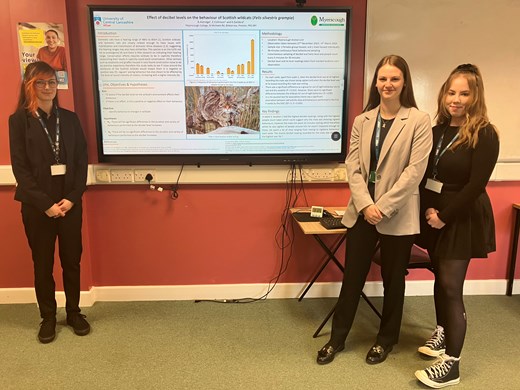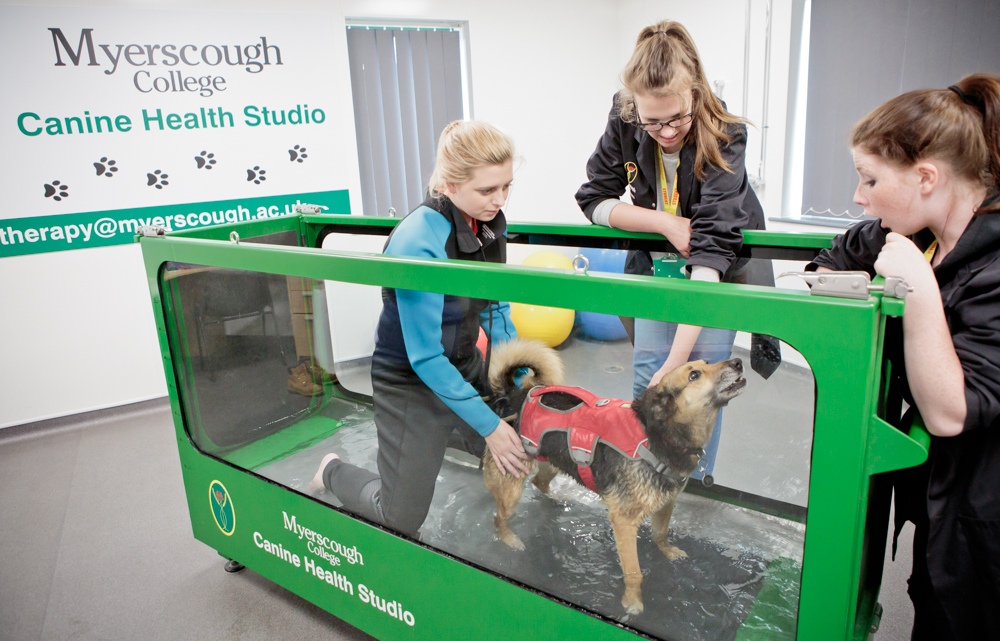Course modules
Year 1
Animal Health and Nutrition
The module will discuss the aetiology of diseases and associated characteristics. The module will develop plans for animal health enhancement and disease control strategies and introduce the concept of pharmacological control. This module also aims to explore the biological and biochemical principles which underpin animal nutrition and further develop scientific knowledge as a basis for the continuing acquisition of information. The module will develop a critical interest in current applied research in animal health and nutrition and how this may be applied to practical animal feeding management and production with due consideration to commercial, health, environmental and welfare factors.
Animal Anatomy and Physiology
The module aims to enable the students to describe the natural anatomical and physiological mechanisms that control behaviour, reproduction and defence against disease and impact on an animal’s welfare.
Practical Animal and Professional Skills
This module aims to develop student academic, cognitive, professional, industry, digital and transferable skills in order to help the transition from further to higher education and from dependent to independent learning. These skills will be developed in the subject specific context in conjunction with other modules and will underpin subsequent years of study. Through personal development, the module also aims to aid future graduate employability potential and will provide the foundation for further development through study on the ‘Integrated Industry Project’ module at Level 5 and ‘Research Project’ at Level 6.
Animal Healthcare Management
The module aims to develop a knowledge and understanding of animal healthcare encompassing preventative care and the application of nursing skills in the management of injury or disease to include the administration of pharmacological preparations across a range of species. The module will also provide the student with the appropriate knowledge to recognise common injuries requiring immediate attention across a range of species and to develop the practical skills in order to be able to perform first aid upon an animal casualty or where necessary to support and instruct an animal owner / carer in the administration of animal first aid.
Animal Behaviour and Training
This module aims to develop a practical appreciation of the natural behaviour patterns of animals considering environmental effects. Alongside understanding the principles of species and breed specific factors affecting the animals’ behaviour, this module will examine how these can be adapted as part of a training regime to meet the complex and varied roles demanded of animals. The module will outline the biological principles of animal behaviour and develop an appreciation of current animal behaviour issues. Current applied research will be used to develop scientific knowledge in animal behaviour and will allow students to apply this knowledge to the diverse roles of animals in society and the role of the animal caretaker in forming behavioural responses in the animal.
Introduction to Animal Welfare
This module aims to introduce learners to the field of animal welfare. Current welfare guidelines and policy will be explored in order to develop an appreciation of how welfare principles apply to different aspects of the animal industry. Ethical principles will also be debated and discussed in relation to animal welfare and how these could be applied throughout the course.
Year 2
Animal Welfare and Legislation (Double module)
The module aims to develop a broad understanding of the principles which are used to determine animal welfare and of their relevant welfare legislation. The module will allow the learner to develop scientific knowledge that will act as a basis for the continuing acquisition of information in relation to animal welfare and legislation whilst developing an interest in current applied research in both fields. Current industry concerns of animal welfare will be considered in this module linking animal’s needs with housing and husbandry practices. Current legislation and husbandry recommendations will be considered allowing for the appreciation of their practical application and management across the animal industry. The module will build on theory learnt in the Level 4 module Introduction to Animal Behaviour allowing for industry standards to be discussed and critical evaluation to be developed.
Applied Diagnostic Techniques
The module aims to develop the investigative skills required to analyse haematological, urological, bacteriological, and parasitological laboratory specimens and enabling the student to evaluate the appropriateness of a range of sampling techniques used in the diagnosis of disease. The module will enable the application of knowledge gained from interpretation of clinical findings to the identification of a variety of veterinary conditions.
Research Methods
An understanding of the methods we use to collect data and the subsequent analysis techniques is a fundamental part of functioning within a scientific discipline. Furthermore, technical professions require graduates who can solve problems through the use of background research and are capable of testing concepts using the appropriate methods. The module examines experimental design and the validity of the findings. Students will be taught to design experiments so that the data collected can be assessed for accuracy and reliability. The appropriateness of a range of investigational methods will be explored together with suitable data analysis techniques. The module will enable students to develop a scientific approach to problem solving, which can act as a firm foundation for appraising research throughout their careers. They will gain an understanding of appropriate and inappropriate experimental design and this will enable a critical evaluation of investigational methodology and so enable the student to both conduct, and evaluate the quality of, investigations in their area of study.
Animal Rehabilitation Management
The module aims to provide an introduction to a range of animal rehabilitation techniques and the administration of physical rehabilitation therapies for companion animal species. The principles of pain management and the appropriate use of veterinary analgesic agents to manage and support physical rehabilitation will be discussed.
Integrated Industry Project
This module will provide an opportunity for students to identify a suitable project relevant to a specific animal industry, work with their supervisor in developing the project and report on the outcomes. The module is intended to provide engagement in a work environment for students to investigate a particular project in relation to a specific industry sector. Students will be encouraged to develop professional working relationships, manage their own time and workload and provide evidence of this. Project management skills will be developed through supporting workshop sessions.
Entry requirements & additional information
- Entry requirements
- Learning and assessment
- Progression
- Careers
- Professional accreditations
- Special requirements
Entry requirements
5 GCSE passes at Grade C (4) or above (including Maths and English or equivalent)
Plus 48 UCAS Tariff points from one or more of the following:
- 2 A-levels (A2), at least one at C or above
- BTEC/C&G Level 3
- 2 Scottish Highers at C or above
- 3 Irish Highers at C or above
- International Baccalaureate at 24 points
- NVQ Level 3 in a relevant discipline
- Access to HE Diploma in a relevant discipline
AS levels, BTEC Subsidiary Diploma and Scottish Intermediate 2s may be used to contribute to entry requirements but they are not sufficient for entry on their own. Alternative equivalent qualifications will also be considered positively.
Applicants who believe they may be eligible for Accreditation of Prior Certificated and/or Experiential Learning (APCL/APEL) for certain modules will be considered on an individual basis.
Applicants for whom English is a second language must be able to demonstrate proof of International English Language Testing System (IELTS) at level 6.0 (with no component score lower than 5.5) or equivalent.
All offers may be subject to successful interview
Learning and assessment
Learning Environment:
Students are expected to undertake extensive independent study and research to support lectures, seminars and assessments. Group work and group presentations form an important part of the course. Students will have access to specialist IT hardware and software, an on-line learning environment and reference facility.
Assessment:
Students will complete a variety of assessments including examinations and tests, practical assessments, essays, presentations, reports and group work.
Additional Information:
The course may involve visits or lectures delivered by external speakers who will outline the work/research interests of the various organisations they represent. This provides excellent opportunity to find out about both the technical issues and developments being discussed and the employment and career opportunities available in the various fields.
What work experience can I get?
There is no formal work placement on this course. The Academic and Vocational Skills and Industry Project modules may utilise both on and off site working environments to provide the opportunity for students to develop real practical and technical skills and help prepare them for employment in their chosen subject area, however it is the student’s responsibility to locate a place in industry in order to facilitate these modules.
Progression
On successful completion of the course providing the Research Methods option has been successfully completed, students may apply for the final year of the BSc(Hons) Animal Behaviour and Welfare course.
Careers
The course is designed with the intention that its graduates will be able to function effectively within the canine industry from a fundamental scientific base. Examples of possible careers include:
Rescue Centre work
Education
Research and development
Local authority/Defra/HM customs animal welfare officers
Kennel and Cattery Assistants
Animal Insurance Advisors
Animal Collections and Sanctuary work
Animal Technician
Laboratory Technicians
Training Assistance Dogs
Professional accreditations
All students are encouraged to pursue membership of the Association for the Study of Animal Behaviour (ASAB) and British Society of Animal Science (BSAS) as well as pursuing scholarships and travel awards with other professional animal organisations.
Special requirements
Laboratory coats are required for laboratory practical sessions. Waterproof clothing for field and outdoor visits
Extra Costs:
Additional costs for items that are essential for the course:
· Laboratory Coat - £15
· Waterproofs and Boots £50
· Black Warehouse Coat - £15
Additional costs for opportunities and items that are optional for the course include:
· Field Study trip to South Africa £3,500
Latest news, Animal studies
-
Unforgettable South Africa experiences for animal studies students
- Published
- Thursday 29 Aug 2024
-
Animal studies tutor to attempt famous gruelling fell challenge for local hospice
- Published
- Monday 13 May 2024
-
Degree students present research at national conference
- Published
- Friday 10 May 2024
-
Myerscough continues to evolve ‘Hedgehog Friendly Campus’ status
- Published
- Thursday 9 May 2024
-
Degree students share their research projects at Graduate Showcase
- Published
- Friday 26 Apr 2024
Research
University Centre Myerscough is proud of its commitment to original research. We believe that our teaching and learning, particularly at higher education level, should be underpinned by strong scholarly activities; the pinnacle of which is the Centre's pioneering research programme.
University Centre Myerscough has more than 30 lecturing staff actively engaged in research projects, often working alongside teams of undergraduate and postgraduate students. Relevant research helps to maintain the University Centre Myerscough's position at the forefront of the industries it serves, whilst also adding value and diversity to our curriculum content and styles of teaching.

We host a popular annual research conference (open to students) to highlight our work. Much of this work is undertaken in collaboration with other Higher Education Institutions including the University of Central Lancashire, Lancaster University, The University of Manchester, Anglia Ruskin University and The University of Liverpool.
Our recent Research publications include the following: UCM Research Publications


